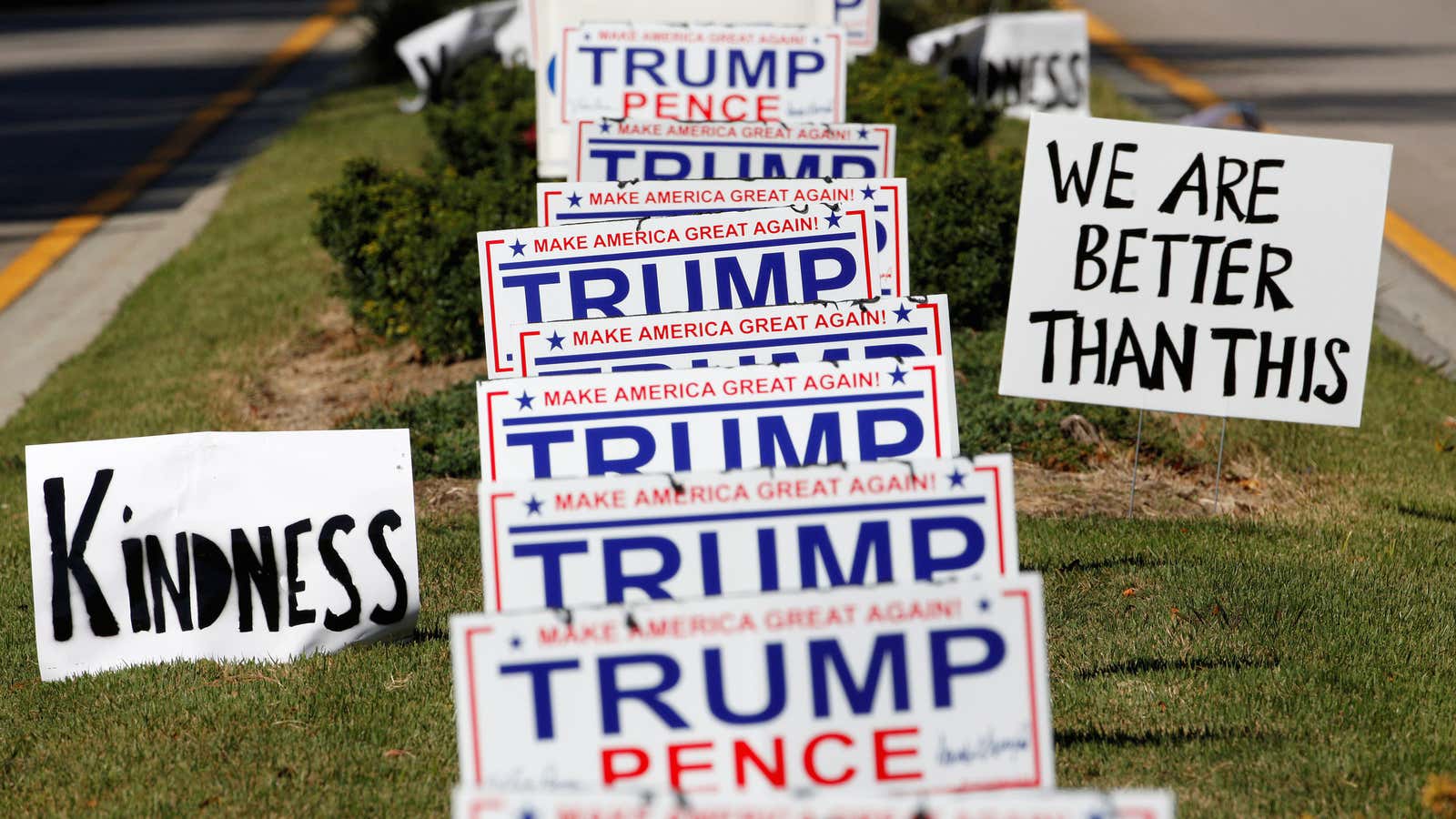Donald Trump is the next president of the United States. It may take American democracy years to recover. That will especially be the case if the Democratic party blames the wrong people for its defeat, and ends up trying to adopt the worst parts of Trumpism for itself.
It’s natural to look for someone to blame in a disaster like this. People have not been slow to point fingers. Given Clinton’s razor-thin margin in many states, her advocates have angrily singled out third-party voters. If people had cast their ballots for Clinton rather than Jill Stein or Gary Johnson, they argue, Trump would not have won. Progressive partisans, in turn, have denounced the Democratic party for favoring Clinton in the first place. Bernie Sanders, they argue, could have won against Trump. Clinton herself has been criticized for running an inept or strategically flawed campaign. Perhaps the most thoughtful version of this argument thus far is by Eric Levitz at New York Magazine, who argues that Clinton should have emphasized her strong economic program more in order to attract some of the white working-class voters whose overwhelming support swept Trump to victory.
There’s plenty of blame to go around, and all of these arguments have merit. The Democratic party certainly needs to think about offering a more emphatic, and more radical, economic message. Clinton primary partisans, and third-party voters, could both stand to reflect on their choices—as could the media.
But it’s also important not to lose sight of the people who are primarily responsible for Trump’s success. That would be the Republican party, which recklessly nominated and then backed a divisive and ignorant candidate, and the voters who cast their ballots to make him president.
Victors always acquire a patina of righteousness, and in a democracy the losing side tends to spend the aftermath of an election looking for ways to duplicate the opposition’s success, rather than condemn it. Conor Friedersdorf of the Atlantic voiced this common sentiment on Twitter earlier when he said said, “The coalition that opposes Donald Trump needs to get much better at persuasion/winning converts, lean much less on stigma. It doesn’t work.” What’s the point of blaming Trump voters, he’s asking, when a successful Democrat will need at least some of them to vote for her?
The problem, though, is that Clinton’s campaign was not based on divisiveness and stigma. She offered a message of inclusion and unity, emphasizing themes of togetherness, diversity, and decency. She did say that perhaps half of Trump’s voters were “deplorable.” But even this statement, while ill-advised, certainly wasn’t characteristic of her campaign message as a whole.
It wasn’t Clinton but Trump who suggested most Mexicans were “rapists.” It wasn’t Clinton who retweeted anti-Semitic memes. It wasn’t Clinton who threatened to put her opponent in jail and who made crude comments about the appearance of women. It wasn’t Clinton who built his campaign on stigmatizing immigrants and people of color, and demonized them as un-American.
Trump ran a campaign based on divisiveness and hate. He wasn’t subtle about it. Those who voted for him may have been voting for other things, but they were certainly also voting for that.
Like America, the Democratic party stands at a perilous crossroads. In the past, when political parties in this country have been defeated by white nationalist coalitions, those parties have often responded by becoming more racist themselves.
In 1876, when the Republican party and the Democratic party tied in the electoral college, the Republicans clung to power by agreeing to adopt the Democrats’ racist platform. The result was the end of Reconstruction, the death of racial idealism, and a hundred years of Jim Crow. In 1992, after 12 years of Republican rule, Bill Clinton came into power in part by copying the racist dogwhistles of his opponents. He insulted rappers, touted his support for the death penalty, and pushed policies that eventually contributed to our ongoing mass incarceration gulag.
Racism isn’t an existential, definitional state; it’s a choice. So too is sexism or homophobia. The United States has, at various times, chosen to become less racist—to abolish slavery, to abolish Jim Crow, to elect a black president. It’s also made choices in its history to become less tolerant. The Republican party, by selecting Trump, has embraced, with renewed fervor, a platform built on division and white nativism. As they regroup, Democrats should be very clear on that point, lest, in their eagerness to learn from the victors, they too choose hate.
